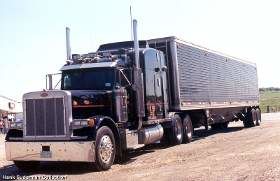Asking For $$$ Advice Before Starting Training
Topic 19789 | Page 1

Boy Colin it really depends on your needs. As an instructor I've seen people at Prime with only the barest of funds. Not a recommended route to take but it's been done.
If selected by Prime they will take care of you room, food and transportation as soon as you arrive. By far they seem to be the most generous company during training. After your first week ( orientation) and when you pass your permit you will be advanced 200 dollars a week for food and incidentals while out with your instructor. This lasts for approximately 3 weeks.
After your PSD phase you will go through your TNT portion and you will receive 700.00 a week training pay. This generally can last between 4 and 6 weeks. Excluding your personal bills I believe somewhere between 500 to 1000 would be more than enough to see you through.
PSD:
Prime Student Driver
Prime Inc has a CDL training program and the first phase is referred to as PSD. You'll get your permit and then 10,000 miles of on the road instruction.
The following is from Prime's website:
Prime’s PSD begins with you obtaining your CDL permit. Then you’ll go on the road with a certified CDL instructor for no less than 75 hours of one-on-one behind the wheel training. After training, you’ll return to Prime’s corporate headquarters in Springfield, Missouri, for final CDL state testing and your CDL license.
Obtain CDL Permit / 4 Days
- Enter program, study and test for Missouri CDL permit.
- Start driving/training at Prime Training Center in Springfield, Missouri.
- Work toward 40,000 training dispatched miles (minimum) with food allowance while without CDL (Food allowance is paid back with future earnings).
On-the-Road Instruction / 10,000 Miles
- Train with experienced certified CDL instructor for 3-4 weeks in a real world environment.
- Get 75 hours of behind-the-wheel time with one-on-one student/instructor ratio.
- Earn 10,000 miles toward total 40,000 miles needed.
TNT:
Trainer-N-Trainee
Prime Inc has their own CDL training program and it's divided into two phases - PSD and TNT.
The PSD (Prime Student Driver) phase is where you'll get your permit and then go on the road for 10,000 miles with a trainer. When you come back you'll get your CDL license and enter the TNT phase.
The TNT phase is the second phase of training where you'll go on the road with an experienced driver for 30,000 miles of team driving. You'll receive 14¢ per mile ($700 per week guaranteed) during this phase. Once you're finished with TNT training you will be assigned a truck to run solo.
Boy Colin it really depends on your needs. As an instructor I've seen people at Prime with only the barest of funds. Not a recommended route to take but it's been done.
If selected by Prime they will take care of you room, food and transportation as soon as you arrive. By far they seem to be the most generous company during training. After your first week ( orientation) and when you pass your permit you will be advanced 200 dollars a week for food and incidentals while out with your instructor. This lasts for approximately 3 weeks.
After your PSD phase you will go through your TNT portion and you will receive 700.00 a week training pay. This generally can last between 4 and 6 weeks. Excluding your personal bills I believe somewhere between 500 to 1000 would be more than enough to see you through.
And don't bother getting your permit and medical card, cause some companies will require new ones and you will have wasted the money.
Ask the company the best route
PSD:
Prime Student Driver
Prime Inc has a CDL training program and the first phase is referred to as PSD. You'll get your permit and then 10,000 miles of on the road instruction.
The following is from Prime's website:
Prime’s PSD begins with you obtaining your CDL permit. Then you’ll go on the road with a certified CDL instructor for no less than 75 hours of one-on-one behind the wheel training. After training, you’ll return to Prime’s corporate headquarters in Springfield, Missouri, for final CDL state testing and your CDL license.
Obtain CDL Permit / 4 Days
- Enter program, study and test for Missouri CDL permit.
- Start driving/training at Prime Training Center in Springfield, Missouri.
- Work toward 40,000 training dispatched miles (minimum) with food allowance while without CDL (Food allowance is paid back with future earnings).
On-the-Road Instruction / 10,000 Miles
- Train with experienced certified CDL instructor for 3-4 weeks in a real world environment.
- Get 75 hours of behind-the-wheel time with one-on-one student/instructor ratio.
- Earn 10,000 miles toward total 40,000 miles needed.
TNT:
Trainer-N-Trainee
Prime Inc has their own CDL training program and it's divided into two phases - PSD and TNT.
The PSD (Prime Student Driver) phase is where you'll get your permit and then go on the road for 10,000 miles with a trainer. When you come back you'll get your CDL license and enter the TNT phase.
The TNT phase is the second phase of training where you'll go on the road with an experienced driver for 30,000 miles of team driving. You'll receive 14¢ per mile ($700 per week guaranteed) during this phase. Once you're finished with TNT training you will be assigned a truck to run solo.

I got on the bus to school with a little more than 500 and by the time I was ready to head to orientation had to borrow some from dad. I'm a smoker so that was a contributing factor. I've seen it recommended here to bring 1000 and that's what I ended up spending before I got my first training paycheck.

Thank you for all of the replies.
I will try to obtain a minimum of $1,000 before starting. I'll also ask each company what they recommend about whether or not I should get my medical card and/or permit before I start training.
I re-started my 30 days of CPAP. I found out that I need a minimum of four hours of CPAP data each night. Working two jobs as I have been doing, I didn't always have the "luxury" of four hours of sleep. I quit one job so I'll be able to get the sleep I need for the CPAP data. I have a long road ahead, but I finally know where I'm going. Feels good.
Thanks again! Stay Safe Out There, Colin K.
CPAP:
Constant Positive Airway Pressure
CPAP is a breathing assist device which is worn over the mouth or nose. It provides nighttime relief for individuals who suffer from Sleep Apnea.

Is that $1000 or so including the $200 a week advance during the initial few weeks, or is that in addition? I am in the planning process as well.
Is that $1000 or so including the $200 a week advance during the initial few weeks, or is that in addition? I am in the planning process as well.
It depends on how much food you need. Not every company provides an advance. Some companies pay you while you have you permit, other do not.
In my case, I brought $500 to get home if I needed. The advance.money I used for food. Food is cheaper throughout the country than in NJ, so I thought everything was soooo cheap.

Thanks, now that sounds more like what I had planned on. Use advance for food. and bring a little to get back or whatever, just in case. I'm more concerned about maintaining everything at home for the boy and dog during the first month or so.
New Reply:
New! Check out our help videos for a better understanding of our forum features

















Preview:








 TT On Facebook
TT On Facebook
Greetings.
I need some advice from the experts here, please. Sorry if this is long.
How much money would I realistically need to set aside to cover the usual expenses for supplies, etc. for OTR school until the time I start getting paid training? I'm going to have to go the paid company training route and have narrowed it down to four companies.
I've got my Type II diabetes under control and am in the process of collecting my 30 days of CPAP data as I have sleep apnea. My goal is to get my medical card and permit before starting school. I have a clean driving record and no criminal history. When I do this, I'm going all in and will follow the advice given here on how to succeed as an OTR driver. Failure is not an option.
I live near Los Angeles, California. Ideally, I'd like to start training near my home. However, one of the companies that I'm looking at is Prime, which would mean going to Salt Lake City, Utah. I like Prime because of their extensive training program and due to much of what Rainy has written here. (Thank you, Rainy, for sharing so much great information!)
Some quick backstory. I'm 54 years old and have no immediate family. I can be gone from home for longer periods of time than most. I'm also an introvert and am ready for an adventure in my life. Working 14 hours a day will be less than working the two jobs that I've been working, but with better pay.
I've been out of work for two years due to being laid off, with only some seasonal and temp jobs in between. My savings is gone. I'm going to be selling most of my possessions before I start school. I'm hoping to get a realistic goal of how much money I need to raise before I take the OTR plunge.
Thank you in advance for any advice that you can share. Stay safe out there!
Best Regards, Colin K.
OTR:
Over The Road
OTR driving normally means you'll be hauling freight to various customers throughout your company's hauling region. It often entails being gone from home for two to three weeks at a time.
Sleep Apnea:
A physical disorder in which you have pauses in your breathing, or take shallow breaths, during sleep. These pauses can last anywhere from a few seconds to a few minutes. Normal breathing will usually resume, sometimes with a loud choking sound or snort.
In obstructive sleep apnea, your airways become blocked or collapse during sleep, causing the pauses and shallow breathing.
It is a chronic condition that will require ongoing management. It affects about 18 million people in the U.S.
CPAP:
Constant Positive Airway Pressure
CPAP is a breathing assist device which is worn over the mouth or nose. It provides nighttime relief for individuals who suffer from Sleep Apnea.